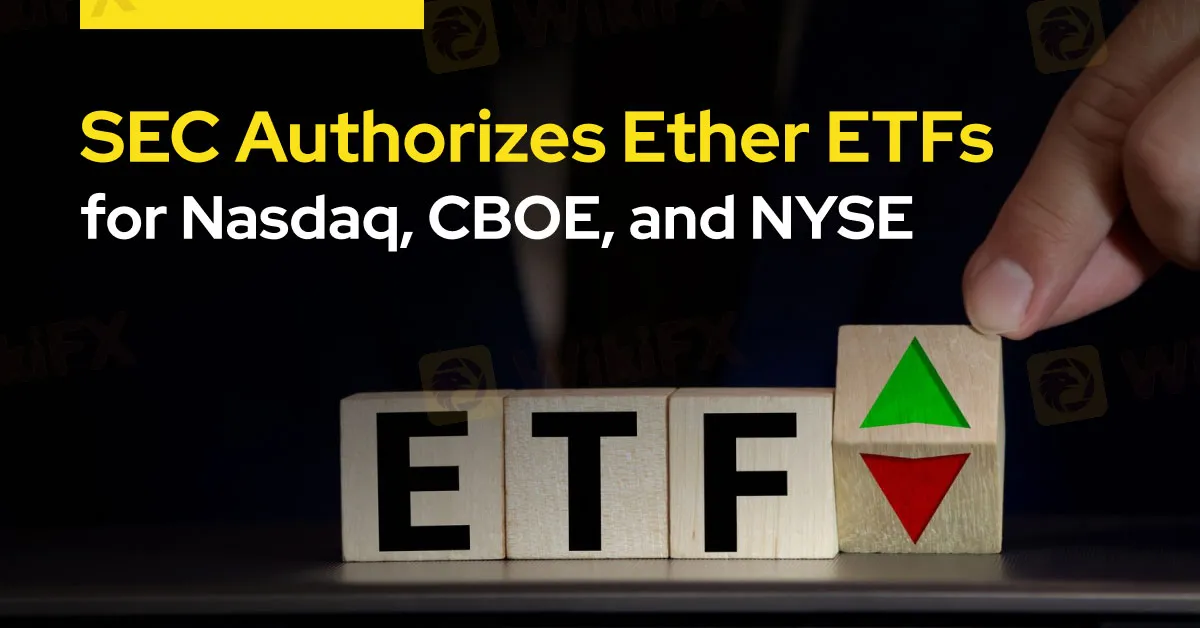简体中文
繁體中文
English
Pусский
日本語
ภาษาไทย
Tiếng Việt
Bahasa Indonesia
Español
हिन्दी
Filippiiniläinen
Français
Deutsch
Português
Türkçe
한국어
العربية
SEC Authorises Ether ETFs for Nasdaq, CBOE, and NYSE
Abstract:The US Securities and Exchange Commission (SEC) has approved applications from major exchanges, including Nasdaq, CBOE, and the NYSE, to list exchange-traded funds (ETFs) tied to the price of ether. This approval potentially paves the way for these products to begin trading later this year.

The US Securities and Exchange Commission (SEC) has approved applications from major exchanges, including Nasdaq, CBOE, and the NYSE, to list exchange-traded funds (ETFs) tied to the price of ether. This approval potentially paves the way for these products to begin trading later this year.
Following the SEC's approval of spot Bitcoin ETFs in January, nine issuers, including VanEck, ARK Investments/21Shares, and BlackRock, applied to launch ETFs tied to ether. Despite this positive development, these applicants must still secure approval for ETF registration statements, which detail investor disclosures, before the funds can commence trading.
The SEC stated that after careful review, the commission found the proposals to be consistent with the Exchange Act and the rules and regulations applicable to a national securities exchange. Specifically, the commission determined that the proposals met the requirements of Section 6(b)(5) of the Exchange Act, which mandates that the Exchanges' rules be designed to prevent fraudulent and manipulative acts and practices and to protect investors and the public interest.

Market participants were bracing for a negative outcome, especially given the SEC's lack of engagement on the applications, Reuters reported. However, in an unexpected turn of events, SEC officials requested the exchanges to make swift adjustments to the filings on Monday, leading to a rush to meet the new requirements in a short timeframe.
Despite the approval, the SEC has not set a deadline for deciding on the registration statements, leaving industry participants uncertain about when trading might commence. Optimism surrounding the SEC's approval of Ether ETFs has already pushed the price of the second-largest cryptocurrency up by 25% on the weekly chart. Notably, asset management firms plan to avoid staking.
Staking is the process of holding funds in a cryptocurrency wallet to support the operations of a blockchain network. Specifically, staking represents an effort to secure a volume and derivatives to address regulatory concerns.
In the run-up to the decision-making deadline, SEC Chair Gary Gensler, known for his scepticism toward cryptocurrencies, declined to comment when reporters inquired about the ether ETFs. A spokesperson from the commission also stated that the agency would not provide further comments on the matter. Earlier, a section of the US Congress had urged Gensler to approve ether ETFs.

Disclaimer:
The views in this article only represent the author's personal views, and do not constitute investment advice on this platform. This platform does not guarantee the accuracy, completeness and timeliness of the information in the article, and will not be liable for any loss caused by the use of or reliance on the information in the article.
Read more

Why More People Are Trading Online Today?
Discover why online trading is booming with tech, AI, and a push for financial freedom. From stocks to crypto, it’s a thrilling hustle for all.

SEC Ends Crypto.com Probe, No Action Taken by Regulator
The SEC has closed its investigation into Crypto.com with no action taken. Crypto.com celebrates regulatory clarity and renewed momentum for the crypto industry.

Interactive Brokers Expands Crypto Trading with Solana, XRP, Cardano, and Dogecoin
Interactive Brokers adds Solana, XRP, Cardano, and Dogecoin to its platform, enabling U.S. and U.K. clients to trade crypto 24/7 with low fees.

Bank Central Asia Addresses Cryptocurrency Scam Claims
Bank Central Asia responds to a cryptocurrency scam using its accounts, targeting investors via social media. Learn about the scam and BCA’s stance.
WikiFX Broker
Latest News
Enlighten Securities Penalized $5 Million as SFC Uncovers Risk Control Failures
Why Are Financial Firms Adopting Stablecoins to Enhance Services and Stability?
Experienced Forex Traders Usually Do This Before Making a Lot of Money
Octa vs XM:Face-Off: A Detailed Comparison
When High Returns Go Wrong: How a Finance Manager Lost RM364,000
Bridging Trust, Exploring Best—WikiEXPO Hong Kong 2025 Wraps Up Spectacularly
Fidelity Investments Explores Stablecoin Innovation in Digital Assets Sector
Interactive Brokers Expands Crypto Trading with Solana, XRP, Cardano, and Dogecoin
SEC Ends Crypto.com Probe, No Action Taken by Regulator
Why More People Are Trading Online Today?
Currency Calculator







